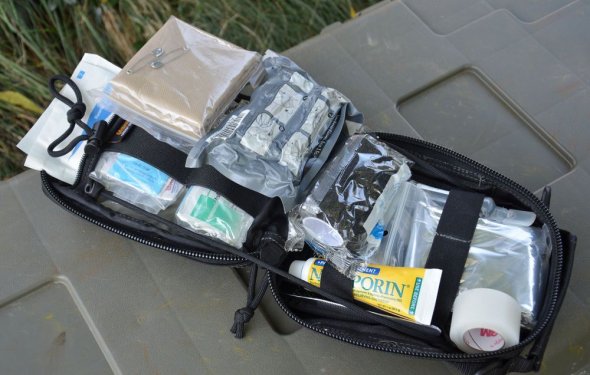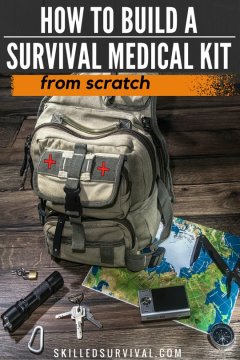Build your own medical kit


Everyone Needs A Survival Medical Kit.
It will not matter where you are or what you are doing when misadventure strikes. If you are not prepared to manage a health emergency when it happens, things will get serious quickly.
Whether you are camping in the wilderness, exploring a foreign country, navigating the high seas, or simply surviving a catastrophic doomsday scenario – having a functional medical kit is essential for anyone concerned with effective survival. And any medical worker knows that really good ones, the kind that gives you peace of mind, are hard to come by.
But fear not! This article serves to solve that problem.
The following describes everything necessary to build a tactical medical survival kit. Some of these supplies will be extraneous to medical novices. But if followed verbatim, it will prepare you for nearly any acute medical problem.
Use this as a personal guide or supplement to aid your medical preparation. You’ll be grateful you did.
Survival Medical Kit List
Medical experience is an extremely helpful accessory to this project, but it’s not a skillset that everyone has. The most important part of building a medical survival kit is an understanding of how to use what is inside.
Enroll in an EMT course at your local community college. Sign up for Wilderness First Responder training. Take a CPR class or just get your hands on something as simple as “Basic First Aid” or even “First Aid For Dummies”. Make sure to read it cover to cover.
You’ll be amazed what a difference it makes to know the basics.
The Basics
From diarrhea to headaches and inflammation, small cuts and minor infections, the basics has it covered. These basics will be the most heavily used resources in your medical survival kit. So they should be the most accessible as well. So be sure to pack extra.
Most of these supplies can be bought at drugstores or pharmacies. Places such as Walgreens and many are even available online. You should have no trouble assembling the contents for this section.
Tools
Over-The-Counter Medications (Recommended numbers included)
Wounds and Trauma
This is where a more advanced level of medical training comes in useful.
Treating wounds is not always a simple ordeal – especially trauma – and it is often a job that is best left to the professionals. But in a survival situation, it may be your responsibility to treat these injuries to the best of your ability.
Realistically, outside of a hospital, no one is prepared for every medical emergency. Wounds can be ugly. Trauma can be horrifying. But here are some tools that will help prepare you for both:
Prescription Medication
Individuals seeking to build an advanced medical kit should consider including some prescription medications.
These drugs require an advanced understanding of medicine to administer. But if you have access to these supplies and have reason to believe you will need them in the field, prepare yourself accordingly.
Miscellaneous and Personal
Storage and Maintenance
Collecting the contents for a survival medical kit is only the first step in building your own. After buying the supplies, you need to pack them into something. Whether you use a bag, a box, a basket, or an entire emergency vehicle, you must store your medical kit properly, and as orderly as possible.
Which requires a meticulous approach. Take your time, and think this through. How will you build this to best suit your needs?
Choosing The Right Container
Will you be storing your medical kit in a home or a car? Is this something you will have to move with, and carry places? How durable does your med kit need to be? How thorough?
Size, shape, weight, and intention are all important factors to consider at this point.
If you are going to be rafting down the Grand Canyon, you need a waterproof bag that can easily transport between rafts.
If you are going on a backpacking trip through South East Asia you will need something small, light and packable.
Wilderness Responders use small duffle bags or entire backpacks for their medical kits.
Choosing your container may seem like a mundane decision, but in reality, the choice carries a lot of weight. Make your survival medical kit the perfect fit – customize it so that it best serves and protects you.
Here are some examples of excellent medical kit containers:
As A Way To Introduce You To Skilled Survival, We’re Giving Away Our
Keeping an organized medical kit is equally as important as any of the contents. In a medical pinch, time is of the essence. Neither patient nor caretaker can afford to waste any time sifting through a sack full of unlabeled drugs and sterile swabs. Preparation is everything.
Divide your kit into a few general categories. There are a number of ways you might approach this, but one effective example is to separate the contents as follows:
- Trauma
- Prescription medication
- Over the counter medication
- Personal supplies